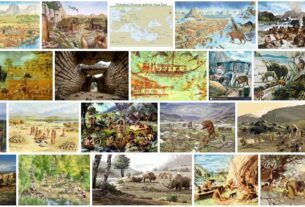Nigeria, located in West Africa, has a rich history of foreign trade dating back centuries. The country’s strategic geographical position, abundant natural resources, and diverse culture have played significant roles in shaping its trade dynamics. This essay explores Nigeria’s foreign trade, examining its historical context, key trading partners, major exports and imports, challenges, and the impact of globalization.
Historical Context: Nigeria’s foreign trade has deep historical roots, with early trade routes connecting the region to North Africa and the Middle East. The Trans-Saharan trade routes facilitated the exchange of goods such as gold, salt, and textiles. The arrival of European traders in the 15th century, notably Portuguese explorers, marked the beginning of a new era in Nigeria’s foreign trade. The slave trade became a dominant force, with European powers establishing trading posts along the coast.
Colonial Era: The colonization of Nigeria by the British in the late 19th century had a profound impact on its trade. The British exploited Nigeria’s resources, focusing on palm oil, rubber, and cocoa. The economy became heavily dependent on these commodities, and Nigeria’s trade was primarily oriented towards the colonial power. The exploitation of resources laid the foundation for Nigeria’s export-oriented economy, a trend that persisted after independence in 1960.
Post-Independence Period: Following independence, Nigeria sought to diversify its economy and reduce dependence on a few primary commodities. The government implemented policies to promote industrialization and boost non-oil exports. However, oil soon emerged as a dominant force, and by the 1970s, it accounted for a significant portion of Nigeria’s foreign exchange earnings. The oil boom brought prosperity but also made the economy vulnerable to fluctuations in global oil prices.
Key Trading Partners: Nigeria’s foreign trade is characterized by a mix of regional and global engagements. The country’s major trading partners include China, the United States, India, and European Union countries. According to Eningbo, China has become a crucial partner, involved in both imports and exports. The United States remains a significant market for Nigerian oil exports, while India is a major importer of Nigerian agricultural products.
Major Exports and Imports: Nigeria’s export profile is dominated by oil and gas, which account for a substantial portion of its foreign exchange earnings. Crude oil, liquefied natural gas (LNG), and petroleum products are the primary exports. On the import side, machinery, vehicles, chemicals, and food products are major categories. The trade balance has historically been in favor of exports, largely due to oil revenue, but this has also made the economy vulnerable to oil price fluctuations.
Challenges in Foreign Trade: Nigeria faces various challenges in its foreign trade, including infrastructural limitations, bureaucratic bottlenecks, and policy inconsistencies. Inadequate transportation networks and port facilities hinder efficient trade logistics. Additionally, corruption and inefficiencies in government agencies can contribute to delays and increased transaction costs. Addressing these challenges is crucial for enhancing the competitiveness of Nigerian goods in the global market.
Globalization’s Impact: Globalization has both positive and negative implications for Nigeria’s foreign trade. On the positive side, it provides opportunities for market expansion and technology transfer. However, globalization also exposes Nigeria to increased competition and economic volatility. The country must adapt to the changing global economic landscape to ensure sustainable growth and development.
Nigeria’s foreign trade has evolved significantly over the centuries, from ancient trade routes to modern global interactions. The country’s reliance on oil exports and the challenges it faces underscore the need for diversified and sustainable trade practices. Addressing infrastructural limitations, improving policy consistency, and embracing the opportunities presented by globalization are essential steps in ensuring Nigeria’s foreign trade contributes to long-term economic development.


